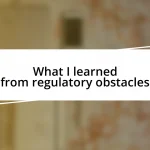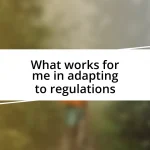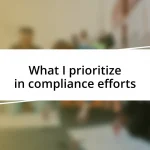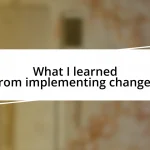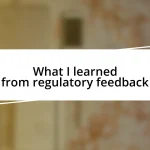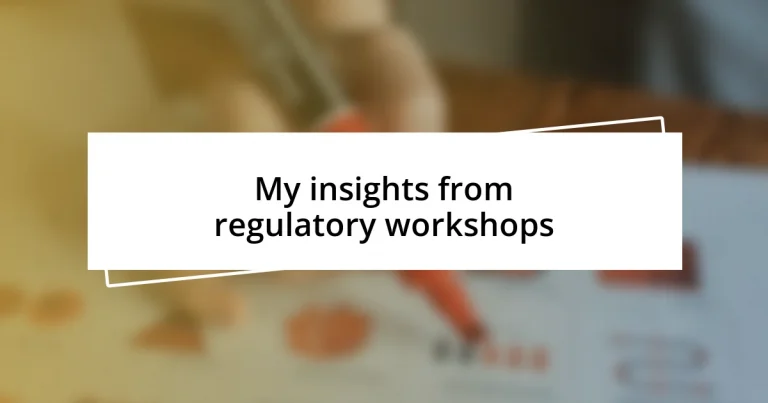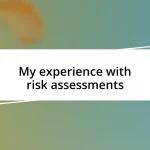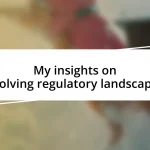Key takeaways:
- Regulatory workshops foster collaboration and innovation by encouraging shared experiences and diverse perspectives among participants.
- A proactive approach to regulatory compliance is essential for organizations to navigate changes effectively and avoid unnecessary stress.
- The integration of technology, such as AI, along with a focus on mental health and storytelling, can enhance compliance practices and organizational culture.
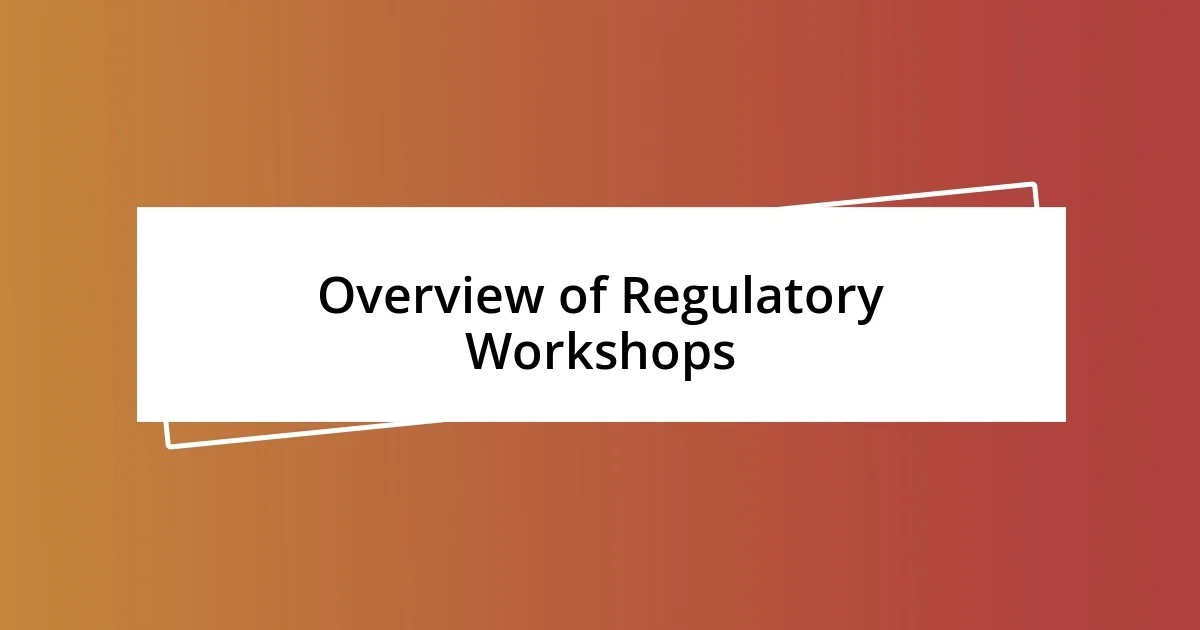
Overview of Regulatory Workshops
Regulatory workshops are essential events where stakeholders gather to discuss and clarify guidelines that govern various industries. I remember attending one workshop where the atmosphere was filled with a palpable sense of urgency. It felt like we were all in the same boat, eager to navigate the choppy waters of ever-evolving regulations together. Have you ever found yourself in a situation where collective understanding sparks innovative solutions? That’s the beauty of these workshops.
In my experience, these workshops are not just about compliance; they often transform into brainstorming sessions. During one particularly memorable session, participants shared personal stories about how new regulations impacted their operations. This openness fostered a collaborative spirit, leading to breakthroughs that no one could have anticipated. It’s moments like these that remind me of the power of shared experience and community.
Moreover, the diverse representation from various sectors creates a rich tapestry of perspectives. I’ve found it fascinating to see how insights from one field can illuminate challenges in another. Isn’t it interesting how a strategy successful in one regulatory environment can inspire adaptation in another? This cross-pollination of ideas not only enhances our understanding but also encourages innovation, ultimately benefiting everyone involved.
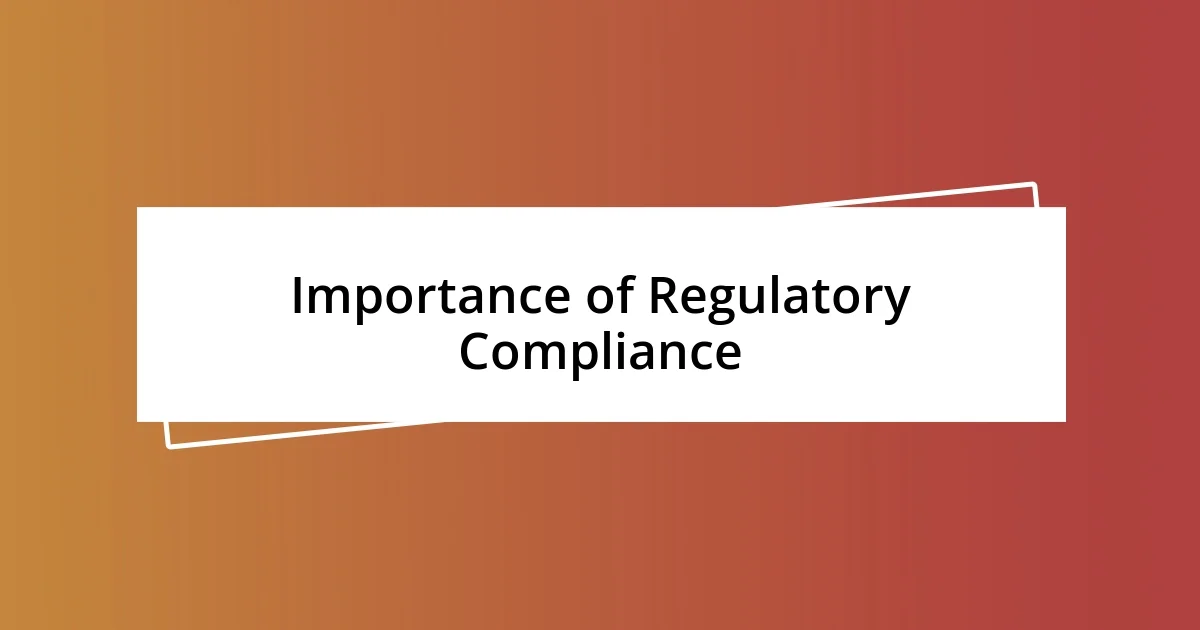
Importance of Regulatory Compliance
Regulatory compliance is more than just adhering to rules; it’s about building trust and credibility in any industry. I vividly recall a time when a sudden regulatory change left many companies scrambling. Those that had robust compliance programs not only navigated the situation smoothly but also emerged with a stronger reputation among customers and stakeholders. It’s incredible how investing in compliance can turn a potential crisis into an opportunity for growth.
Recognizing the importance of regulatory compliance, here are some key benefits:
- Risk Mitigation: Proper compliance reduces the likelihood of legal issues and financial penalties.
- Enhanced Reputation: Companies known for compliance earn trust among customers and partners, which can lead to loyal relationships.
- Operational Efficiency: Understanding and integrating compliance into processes can streamline operations and reduce redundancies.
- Market Access: Many industries require compliance as a prerequisite for market entry; non-compliance can shut doors to potential growth.
- Employee Engagement: A culture of compliance fosters a sense of responsibility among employees, boosting morale and commitment to the organization.
Reflecting on these points, it’s clear that the commitment to compliance is a vital investment in an organization’s future. The peace of mind that comes from knowing your operations align with regulations is not just a luxury; it’s a necessity I wish every leader fully embraced.
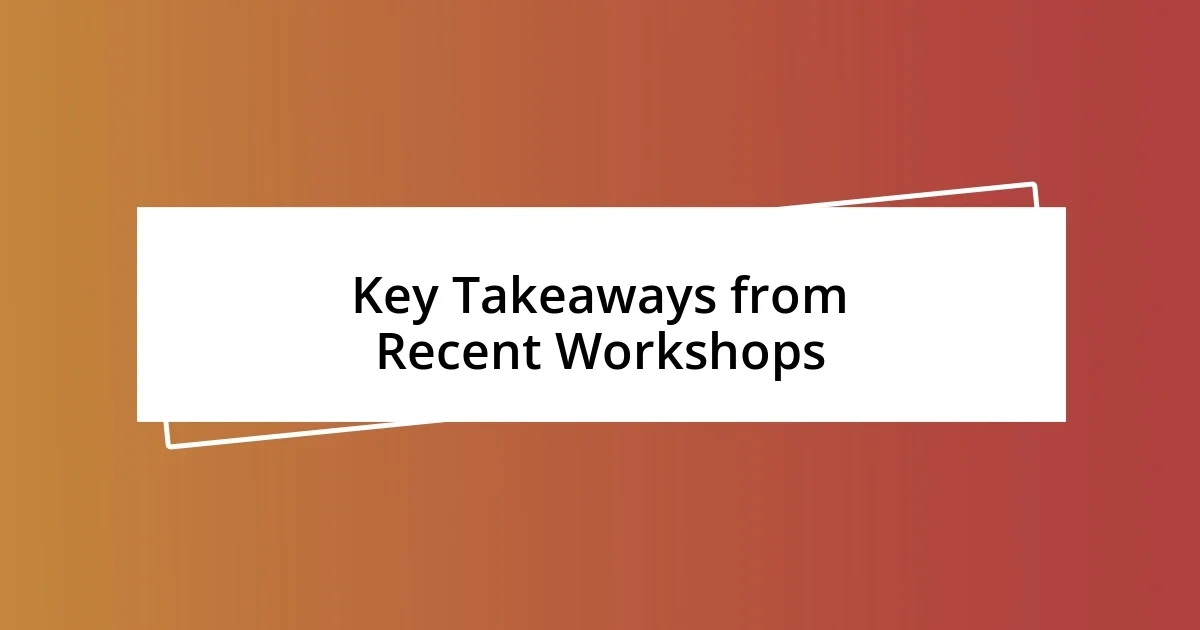
Key Takeaways from Recent Workshops
Attending recent regulatory workshops has been an eye-opening experience for me. One particular moment stands out: when a speaker shared their firsthand account of a compliance crisis. The tension in the room was tangible, yet it transformed into a constructive dialogue about innovative solutions. I realized that these workshops serve not just as a platform for sharing information but also as a catalyst for fostering resilience within our industries. Have you ever participated in a discussion that completely reshaped your approach to a challenge? It’s illuminating how shared adversity can unify and empower us.
Another significant takeaway was the emphasis on the evolving nature of regulations. During discussions, I found many participants echoing the sentiment that being proactive rather than reactive is vital. It reminded me of a time I was caught off-guard by a regulatory update, which led to compliance delays and stress. Learning from this experience, I now appreciate the value of staying ahead of the curve. Regular engagement in these workshops is crucial not only for updates but also for networking with professionals who can share insights on best practices.
Moreover, the workshops highlighted the importance of fostering an inclusive environment to discuss compliance. I distinctly recall one workshop where a younger participant bravely shared their views, which sparked a lively debate. This openness encouraged everyone to express their thoughts, regardless of experience level. Seeing this willingness to engage reinforced my belief that diverse perspectives lead to well-rounded solutions. Isn’t it inspiring how a single voice can spark broader conversations that ultimately shape our understanding?
| Key Takeaways | Insights |
|---|---|
| Shared Experiences | Collaboration fosters innovation, as seen in stories shared during workshops. |
| Proactive Approaches | Staying ahead of regulations is vital; being reactive can lead to stress and complications. |
| Diverse Perspectives | An inclusive environment encourages dialogue that enhances understanding and problem-solving. |
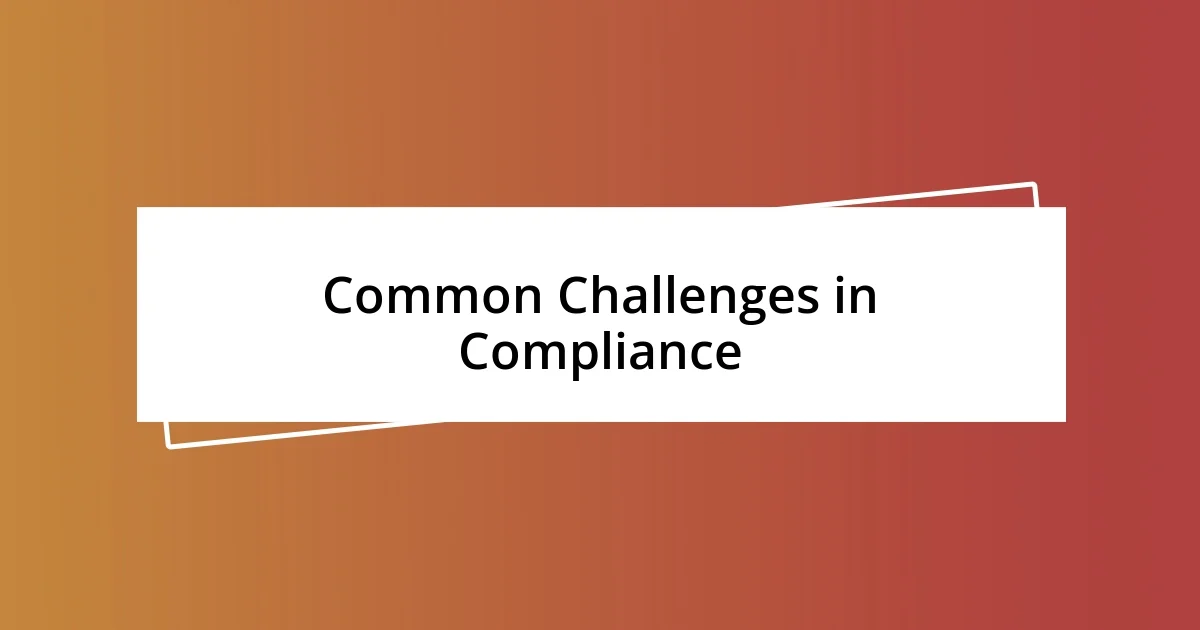
Common Challenges in Compliance
Navigating the waters of compliance often reveals common challenges that can hinder an organization’s progress. For instance, I recall working with a company that faced significant obstacles when trying to adapt to a new data protection regulation. The team felt overwhelmed, not just by the complexity of the rules but also by the sheer volume of changes needed in our existing systems. It taught me that a lack of clear communication and training can lead to confusion and compliance failures.
Another recurring challenge is the disconnect between compliance teams and other departments. While attending a workshop, I noticed how some participants shared their struggles with creating interdepartmental collaboration. One speaker passionately described how their marketing team was oblivious to regulatory restrictions, resulting in a costly misstep. This experience emphasizes the need for a holistic approach to compliance—ensuring that everyone in the organization understands their role in maintaining compliance is crucial.
Lastly, the pressure to keep up with constantly changing regulations can be daunting. I’ve seen organizations work tirelessly to meet compliance obligations only to find new requirements surfacing shortly after. It’s almost like playing an endless game of catch-up. Isn’t it exhausting? This reality drives home the importance of agile frameworks that allow businesses to respond swiftly to regulatory shifts, turning potential headaches into opportunities for improvement and growth.
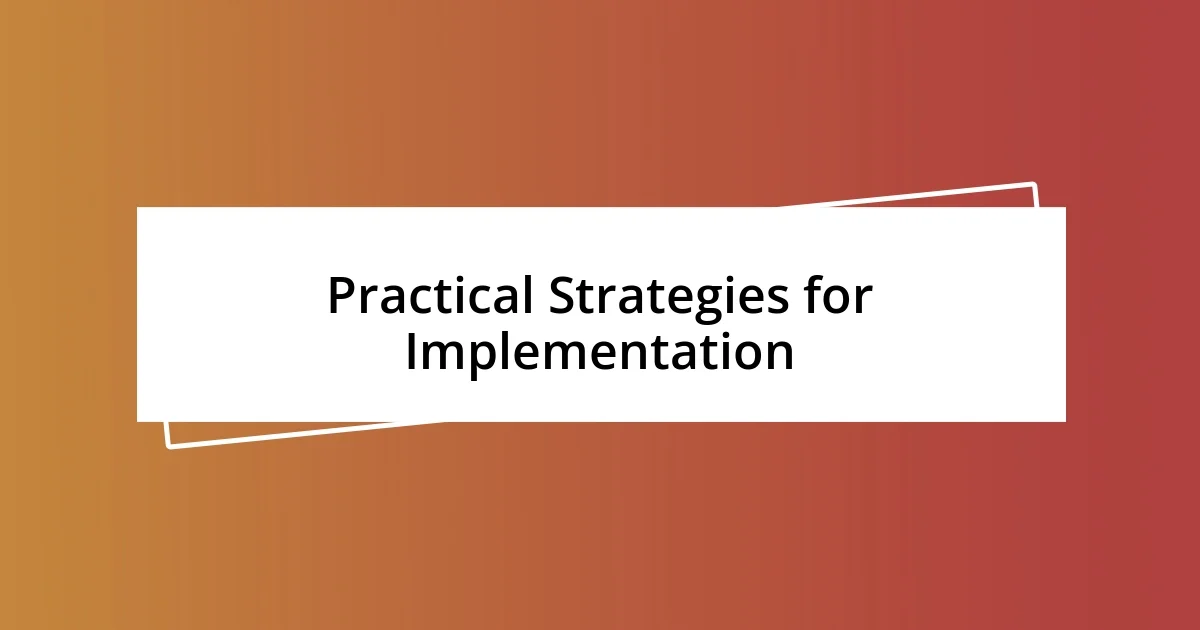
Practical Strategies for Implementation
Implementing practical strategies from regulatory workshops requires a clear, actionable plan. From my experience, breaking down regulations into manageable tasks can transform a daunting challenge into a series of achievable steps. I once worked with a team that developed a checklist to address compliance updates, which turned chaos into order. Have you ever felt relief from simply checking off completed tasks?
To facilitate implementation, regular training sessions are invaluable. I recall a session where we role-played various compliance scenarios, which not only educated but also built confidence among team members. This approach created a shared language around compliance, empowering everyone to contribute. Isn’t it amazing how a little practice can make a complex subject feel more approachable?
Engaging stakeholders early in the process can significantly enhance buy-in and collaboration across departments. I’ve seen firsthand that when key players participate in the initial discussions, they feel a sense of ownership over the outcomes. This can lessen resistance and foster a culture of compliance throughout the organization. Isn’t collaborative involvement a powerful way to create lasting change?
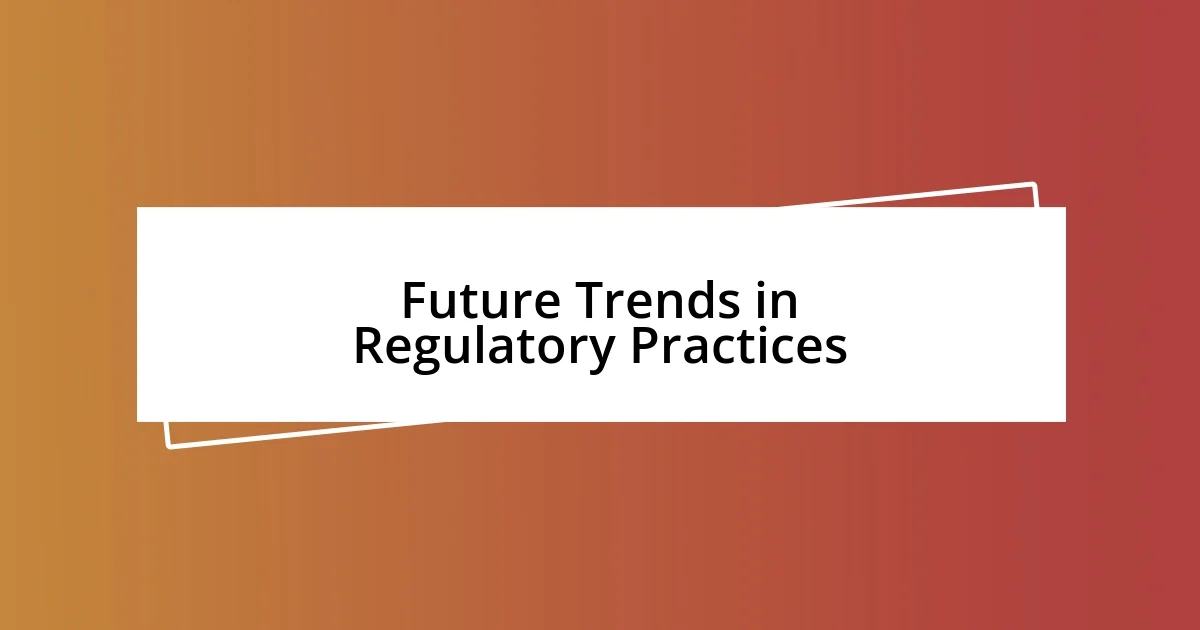
Future Trends in Regulatory Practices
The future of regulatory practices is steering towards a fusion of technology and compliance. I remember attending a workshop where an expert highlighted the transformative potential of artificial intelligence in detecting compliance breaches. It was fascinating to see how real-time monitoring systems can flag issues before they escalate. Have you ever wished you had a crystal ball to foresee compliance challenges? AI may not be magic, but it certainly brings us closer to that capability.
Moreover, I’ve noticed a growing emphasis on transparent communication and stakeholder engagement in regulatory environments. During one session, a discussion arose around incorporating feedback loops from employees at various levels to improve compliance strategies. This approach not only fosters a culture of accountability but also empowers individuals to voice concerns, reflecting an environment built on trust. Isn’t it inspiring to think about a workplace where everyone is on the same page regarding regulatory commitments?
Additionally, the trend of adopting a risk-based approach is gaining momentum. I’ve seen organizations transition from a check-the-box mentality to a more nuanced understanding of risk management. This shift promotes proactive measures and prioritizes resources toward areas with the highest impact potential. Have you ever felt the difference in motivation when a team focuses on meaningful outcomes rather than mere compliance? Shifting our perspective in this way can truly revolutionize how we approach regulation.

Personal Reflections and Insights
Reflecting on my experiences at regulatory workshops, I’ve often found that the most profound insights arise from discussions with peers. There was a moment during one workshop where a colleague shared a story about a compliance failure that could have been avoided with better communication. Hearing her speak so openly not only struck a chord with me but also created a sense of solidarity in sharing our challenges. Have you ever felt that relational connection through vulnerability? It’s a powerful reminder that we’re all navigating this complex landscape together.
I also remember a workshop where we explored the emotional toll of regulatory work on individuals. As someone who has faced burnout, I appreciated the conversations around self-care and resilience. It was eye-opening to realize that addressing mental health in compliance isn’t just an afterthought; it needs to be an integral part of our strategy. Wouldn’t it be transformative if every organization prioritized the well-being of its compliance teams? This sentiment resonates deeply with me and highlights an essential truth: happier teams lead to better outcomes.
Through these workshops, I’ve gained a newfound appreciation for the power of storytelling in regulatory discussions. I’ve witnessed how sharing personal anecdotes can demystify complex regulations and make them relatable. By framing compliance issues in the context of real-life experiences, we foster a culture of understanding rather than just compliance. Isn’t it amazing how a simple story can create bridges of knowledge? It underscores the importance of empathy in our work, reminding us that behind every regulation, there are people affected.



